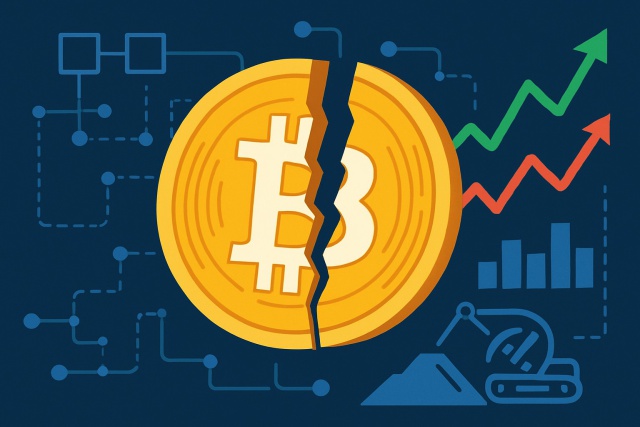How Companies Build Bitcoin Treasuries?


A growing number of companies have dipped their toes into building bitcoin treasuries as part of their financial playbook. These treasuries are essentially corporate reserves of bitcoin, held not just as a store of value but also as a hedge and a savvy investment asset. This marks a noticeable shift from the old-school cash reserves to more modern digital assets, fueled by bitcoin's standout qualities like scarcity and decentralization.
What Exactly Are Bitcoin Treasuries Anyway
Bitcoin treasuries are corporate stashes of bitcoin that companies keep to manage their overall treasury. These are not your run-of-the-mill cash reserves like the ones held in traditional fiat currency. Instead these bitcoin holdings serve as strategic assets and help mix things up in the portfolio.
- Corporate treasury is about juggling a company's assets, liquidity and risks to keep things running smoothly and ensure financial stability.
- A bitcoin treasury is a slice of corporate treasury where bitcoin is held as a reserve asset or added to investment portfolios for extra flavor.
- Bitcoin stands out as an asset class because of its scarcity and decentralization which give it a unique edge.
- Treasury diversification means spreading reserves across different asset types to reduce risk and smooth out bumps.
- Bitcoin is increasingly seen as a reserve asset like gold and is often used as a hedge when currencies lose value or inflation rises.
Why Do Companies Decide to Build Bitcoin Treasuries These Days?
More companies are adding bitcoin to their treasuries as a clever way to hedge against inflation and diversify their assets while chasing potential long-term growth.
- Bitcoin often steps in as a handy hedge against inflation and the decline of currencies especially when economic clouds start gathering.
- It holds its ground as a store of value largely because there’s a hard cap of 21 million coins that helps keep dilution risks at bay.
- Tossing some bitcoin into corporate portfolios can add a fresh layer of diversification beyond the usual suspects like fixed income and equities.
- Building a bitcoin treasury usually signals corporate innovation and tends to catch the eye of investors who have a soft spot for cutting-edge tech.
- Keeping bitcoin on hand might just give liquidity management a boost by offering an alternative asset class with markets that are growing deeper and more robust by the day.
price swings that can make your head spin and regulatory puzzles that keep evolving.
A Straightforward Guide to Building a Bitcoin Treasury That Actually Works
Building a bitcoin treasury usually calls for a careful step-by-step process that involves learning and solid strategic planning. It requires smartly acquiring assets, locking down security, keeping compliance in check, and ongoing management. Companies really need to get their internal teams singing from the same hymn sheet and customize their investment guidelines to fit their unique vibe.
Educate internal stakeholders thoroughly by clearly explaining the benefits and potential risks of bitcoin. Be honest and straightforward so everyone understands the situation.
Carefully assess your company’s tolerance for risk and adjust your investment policies to include cryptocurrency assets comfortably. It’s like setting the thermostat to just the right temperature.
Choose how you want to acquire bitcoin with care. Whether through direct purchases, OTC deals, ETFs or bitcoin trusts, each method has its own characteristics so select the one that fits your approach best.
Find a custody solution that balances strong security with easy access. Consider the advantages and disadvantages of self-custody or using a third-party custodian. This often comes down to personal preference.
Establish secure storage practices such as multisig wallets and cold storage alongside sensible risk controls. Think of it as locking doors and windows before leaving—not flashy but essential.
Use accounting and reporting standards that accurately represent your bitcoin holdings and their value changes. Being precise here is good practice and a reflection of your financial integrity.
Continuously monitor your treasury by managing liquidity and market risks. Staying vigilant is key in this environment.
Be alert to regulatory changes, keep your disclosures transparent and maintain strong internal controls. Together these steps create a well-protected financial foundation.
Acquisition Strategies Different Routes Companies Take to Snag Bitcoin
Companies get their hands on bitcoin through a variety of channels, each with its own perks and pitfalls. Over-the-counter desks are great for scooping up large volumes while keeping things under the radar and avoiding market fuss, but you might have to be patient during longer settlement times. Exchanges tend to be the straightforward option—liquid and easy to navigate—but big trades might cause problems and there is always some counterparty risk. Bitcoin investment trusts provide a neat way to invest indirectly and often make compliance easier, though you usually pay higher fees and face less liquidity. Then there’s buying on the secondary market through brokers or peer-to-peer deals, which offers more wiggle room.
| Acquisition Method | Cost | Liquidity | Privacy | Speed | Risk Level |
|---|---|---|---|---|---|
| OTC Desks | Moderate | High | Strong | Moderate | Low |
| Cryptocurrency Exchanges | Low to Moderate | High | Low to Moderate | Fast | Moderate (custodial risk) |
| Bitcoin Investment Trusts | High | Low to Moderate | Strong | Moderate | Low (regulated trusts) |
| Secondary Market Traders | Variable | Variable | Variable | Variable | High (fraud risk) |
Tried and True Tips for Custody and Security You Can Rely On
Taking proper custody of bitcoin is absolutely critical for safeguarding corporate treasuries—after all, nobody wants their digital gold slipping through the cracks. Common strategies focus on cold storage and multisignature wallets. Companies also turn to third-party custodians who offer insurance and compliance expertise.
- Keeping private keys offline with cold storage is hands down one of the best ways to dodge the headaches of online hacks.
- Multisignature wallets bring an extra layer of security by demanding multiple approvals before any transaction gets the green light—think of it as a team effort that’s tough to beat.
- Running regular security audits is like giving your custody systems and workflows a thorough check-up, helping spot weak spots before they become a problem.
- Having insurance from trusted providers offers a safety net to cover losses from theft or pesky technical glitches—because sometimes, accidents do happen.
- Enforcing strict key management policies keeps a tight leash on access to assets, making it easier to track who’s doing what and cutting down on internal risks.
Key Points on Accounting, Reporting, and Regulatory Issues You Should Keep on Your Radar
Tracking bitcoin treasuries with pinpoint accuracy can be quite a challenge because of their unique quirks and ever-fluctuating prices. Under US GAAP, bitcoin is treated as an intangible asset and is subject to impairment—something every company dreads but must face head-on. IFRS offers similar guidance and often emphasizes fair value accounting. The details can vary depending on your location. Companies have to watch SEC disclosure rules and stay nimble to adapt to shifting tax regulations.
- Bitcoin is treated as an intangible asset which means it has to be tested for impairment and there’s no room for upward revaluations to brighten the balance sheet.
- They require a fair value assessment and an impairment check.
- They can hit reported earnings hard and often mean companies need to stash aside reserves when prices dive.
- Transparency is the name of the game.
- Bitcoin usually falls under capital gains rules when sold so watch out for holding periods and valuation methods which can feel like a paperwork headache if you’re not prepared.
Real-World Examples of Companies That Have Taken the Plunge and Hold Bitcoin in Their Treasuries
A number of leading companies have openly shared their sizable bitcoin holdings, laying bare a variety of strategies and outcomes.
- MicroStrategy has set the pace by amassing over 100,000 bitcoins and shining a spotlight on bitcoin as a major player in modern treasury assets.
- Tesla’s foray into bitcoin by both buying and briefly accepting it stirred up buzz about how companies might rethink digital asset adoption and treasury flexibility.
- Block Inc. has seamlessly woven bitcoin into its corporate fabric showing it’s all in when it comes to the crypto game.
- Galaxy Digital mixes asset management with advisory services and holds bitcoin to keep its treasury in sync with what its clients want.
- Across finance, tech, and retail, more companies are hopping on the bitcoin bandwagon highlighting a growing trend among corporates that’s hard to ignore.
"Bitcoin offers special mix of scarcity and portability that is surprisingly well-suited for today's corporate treasuries, especially those aiming to safeguard value in the long run. At least, that is been my takeaway." – Michael Saylor, Executive Chairman, MicroStrategy
What You Really Need to Know
Holding bitcoin as part of a company's reserves comes with its fair share of risks—think rollercoaster price swings, pesky cybersecurity threats and ever-changing regulations plus the usual operational headaches. Navigating these pitfalls usually means diversifying investments across various assets, doubling down on solid security measures and keeping a keen eye on compliance rules.
Spread treasury assets across various types to cushion the blow when bitcoin price swings threaten your financial stability.
Lean on hedging tools like options or futures contracts—they're your safety nets when potential losses loom.
Deploy top-notch cybersecurity measures including multi-factor authentication and cold storage because when protecting assets, there’s no such thing as being too careful.
Stay on your toes by keeping compliance policies fresh and aligned with existing and emerging cryptocurrency regulations—no one likes playing catch-up in this fast-moving space.
Build clear crisis response plans for cybersecurity breaches or sudden regulatory curveballs so you can spring into action quickly and smartly when trouble strikes.
Emerging Trends in Managing Corporate Bitcoin Treasuries Shaping the Future
Corporate bitcoin treasury management is poised for some rapid changes. Institutional bitcoin derivatives make it easier for companies to juggle risk in their bitcoin treasuries. Meanwhile, decentralized finance throws open the doors to programmable treasury functions and offers possibilities that were hard to imagine just a short while ago. On top of that, improvements in automating tedious treasury tasks and clearer regulations look set to pave the way for broader adoption.
- More countries jumping on the bitcoin bandwagon as legal tender usually gives corporate interest a nice little boost.
- Companies are scooping up bitcoin faster these days, often spurred on by a bit of competitive spirit and rising market confidence.
- Advances in treasury automation have made managing assets and juggling reporting noticeably smoother.
- Clearer regulations in place help businesses breathe easier, feeling more confident about compliance and keeping legal risks at bay.
- Decentralized custody solutions are on the rise, cleverly using blockchain tech to offer improved security and transparency.
Start Your Crypto Journey with Coinbase Today
Ready to enter the cryptocurrency market but unsure where to begin? Coinbase makes buying, selling, and storing digital assets simple and secure for beginners and experts alike.








